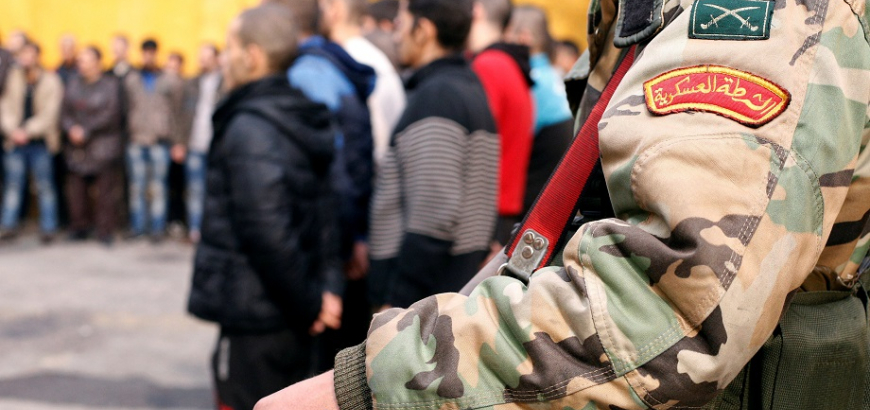Aleppo city and its suburbs have witnessed an increase in the number of regime and militia security checkpoints over the last few days. In parallel with the rise in the number of checkpoints, the number of arrests of people wanted for reserve service has also risen, paralyzing movement in the city.
Syrian men between the ages of 18 and 42 have become afraid to move after regime forces started using their “flying checkpoints” to arrest Syrians whose names appear on the enormous lists of those wanted to perform reserve service in the regime army.
The matter is not limited to those who are wanted for service, but also includes those who are wanted for compulsory service. Additionally, university students who do not have a study delay are being arrested. Alsouria Net has learned from local sources that those students have been sent to the Hananou barracks in central Aleppo, before being transferred to military sectors.
Military police have stepped up their patrols in the Old City market, the Bab al-Faraj square, al-Hadika al-Amma (the public park), al-Abbara, and Baron Street, which are the areas usually filled with young men going to cafes, cinemas, and the restaurants serving cheap food.
Assad’s forces in these areas have arrested hundreds of men, some of whom are over 40. The area has witnessed hunts for young men who are trying to escape the military police, which have shocked families.
Nearly Empty Streets
The security measures and the heavy proliferation of checkpoints, as well as the patrols touring the districts and markets have paralyzed the city almost entirely. The streets have become empty to a large extent of men between the ages of 18 and 42.
Women, children and the elderly are mostly present. Young men are also absent from the bread lines at the bakeries of al-Menshiyeh, New Aleppo, al-Hamdaniyeh, and other major bakeries. Men targeted by the campaign are also absent from gas lines.
High Cost of Flight
Faced with the broad arrest campaign, young men in Aleppo have gathered in front of the conscription directorate and in the student affairs department at Aleppo University to obtain educational deferrals. Some students have stayed three consecutive days in front of the student affairs department to obtain approval, because they cannot return to their homes due to the risk of walking in the street and being caught and arrested by the patrols.
Local sources in Aleppo, who asked not to be named, told Alsouria Net that, “a number of young men who have been arrested over the last 48 hours at security and militia checkpoints have been released after paying large bribes to the checkpoint officers. Bribes can be as high as 1,000 dollars in some districts.”
One source said, “The patrols and checkpoints intentionally intensified their campaign and their pursuit of young men in the western districts of Aleppo, whose residents are considered to be from affluent economic classes, in order to blackmail their children and to force them to pay money in exchange for being released.”
The sources also said that a large number of young men in Aleppo had been able to flee from regime-controlled areas with the assistance of officers in the militias and security branches, and through brokers they have been able to reach areas under the control of the Kurdish People’s Protection Units (YPG) in Manbij. Some young men have also entered opposition-controlled areas in the northeastern Aleppo countryside and in the Euphrates Shield area after they paid money to secure protection and to give them housing, while a smuggler guarantees their entry into Turkey.
The total price for each person who wants to flee reserve and compulsory service in the Assad army can cost more than 3,000 dollars—that is, about a million and a half Syrian pounds. This is an amount that only rich families in Aleppo can afford to pay.
The sources said that the majority of this money goes to the regime militia officers and security branches and brokers, and what remains is paid in two stages to the smugglers operating in the YPG and the smugglers working in the rebel groups in the Aleppo countryside.
The prospect of being sent to reserve and compulsory service in Assad’s forces has sown worry and terror among Aleppo’s residents, and has affected industrial production and commercial sectors. The markets have also seen a decline of buying and selling and some industrial workshops have closed because of the absence of workers.
This article was translated and edited by The Syrian Observer. Responsibility for the information and views set out in this article lies entirely with the author.


